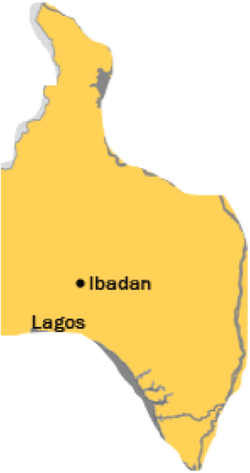Western Nigeria

Physical Environment
Western Nigeria is on the Gulf of Guinea beside the Bight of Benin. This area went from a tropical rainforest to a savanna when people settled there. The land is now cleared to build homes, farm, and sell items.
Ethnic Groups
Western Nigeria's largest ethnic group is the Yoruba. Many of them are Christian, but some follow traditional or Islamic beliefs. The Yoruba settled in Western Nigeria in 100 B.C.E. They lived in villages that soon became kingdoms, each of which had their own dialect of Yoruba. However, some of these dialects may disapear soon, because they are becoming more and more similar. Only one-fifth of all Nigerians speak Yoruba.
Culture
Well-off people in the city live in one-story houses or apartments. Poorer people lived in the outskirts in areas called shantytowns. These consisted of clustered shacks that lacked electricity, running water, or garbage service. People who lived in the countryside lived in houses made of mud bricks with steeply sloped tin or iron roofs. The Yoruba are known for colorful cloth and beads.
Economy
Some Yoruba work in factories, offices, teachers, engineers, or doctors. Yoruba are "backwards" from most Nigerians. The Yoruba go from city work to farm work, and most Nigerians go from living on the farm to living in the city. Yoruba women sell food, homemade cloth, baskets, and other goods.
Western Nigeria is on the Gulf of Guinea beside the Bight of Benin. This area went from a tropical rainforest to a savanna when people settled there. The land is now cleared to build homes, farm, and sell items.
Ethnic Groups
Western Nigeria's largest ethnic group is the Yoruba. Many of them are Christian, but some follow traditional or Islamic beliefs. The Yoruba settled in Western Nigeria in 100 B.C.E. They lived in villages that soon became kingdoms, each of which had their own dialect of Yoruba. However, some of these dialects may disapear soon, because they are becoming more and more similar. Only one-fifth of all Nigerians speak Yoruba.
Culture
Well-off people in the city live in one-story houses or apartments. Poorer people lived in the outskirts in areas called shantytowns. These consisted of clustered shacks that lacked electricity, running water, or garbage service. People who lived in the countryside lived in houses made of mud bricks with steeply sloped tin or iron roofs. The Yoruba are known for colorful cloth and beads.
Economy
Some Yoruba work in factories, offices, teachers, engineers, or doctors. Yoruba are "backwards" from most Nigerians. The Yoruba go from city work to farm work, and most Nigerians go from living on the farm to living in the city. Yoruba women sell food, homemade cloth, baskets, and other goods.
